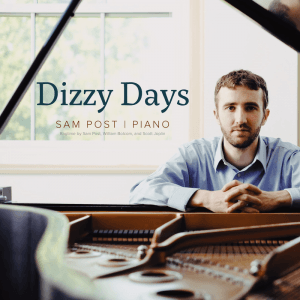At a time when most people are just beginning to hit their stride, Sam Post already has a long list of accomplishments to his name and he has barely broken his first thirty years. As an award-winning classical pianist and composer Sam has performed in many of our nation’s major concert venues, and he has worked with such great virtuosos as Yo-Yo Ma and Renee Fleming.
Post co-composed “Sketches from Kazakhstan” with Karshyga Akhmedyarov. The work was commissioned by the San Francisco Symphony, and premiered as a string quartet, in February 2017, as part of their chamber music series. It was performed again that December, in a chamber symphony adaptation at SoundBox in San Francisco under the baton of Christian Reif.
But this isn’t The Symphonic Times, after all—for it is Sam’s addiction to ragtime that occasions this feature in TST. In the album notes for his latest CD, titled Dizzy Days, Sam recounts suddenly and randomly discovering ragtime several years ago and he was especially influenced by William McNally. Both Post and McNally have been influenced by the work of William Bolcom. On the CD, Sam has infused his own improvisational spirit into Bolcom’s “Graceful Ghost” that has become “essential in my approach to this music,” Post would add.
Sam’s obsession with ragtime has driven several years of study and composition and, in his words, “I’m a classical transplant tackling ragtime, the quintessentially American genre, but taking it in my own direction.”
For his perspective on ragtime, his Dizzy Days CD liner notes provide the best explanation.

“Traditional ragtime occupies this fascinating but awkward niche in today’s American musical culture: it’s not quite classical, it’s not quite jazz; from the former it gleams a certain resistance to experimentation and change, from the latter, a certain embrace of it. It is the original and quintessential American mashup, a mix of classical European influence and “low-class” African and African-American rhythms, and yet has been overshadowed by the genres it spawned, like jazz, rock, and pop…
“I [am] a classically born-and-bred composer-pianist who only became completely enamored of ragtime (and its many syncopated possibilities) several years ago. In this album I’ve taken what I love about ragtime—melodic syncopations over a more-or-less steady accompaniment—and expanded out in the different directions my ears and fingers took me.
“You’ll hear strong influences of Bach and Schumann in my own pieces—but also Thelonious Monk and Wynton Kelly—which aim for a longer dramatic arc than the traditional segmented, strophic rag. In addition, taking a cue from jazz, I experiment heavily with the three classics in this recording by William Bolcom and Scott Joplin, rewriting and improvising in the traditionally repeated sections for a little extra zest, fun, surprise, and of course, counterpoint!”
Among Sam’s long list of compositions, including chamber music sonatas and quartets, vocal carols and other classically eclectic pieces too numerous to mention, there appear on this album eight original rags. From the very first, “Dizzy Spells,” one can hear Sam’s studied familiarity with historic, classic ragtime compositions, but also the new direction he’s seeking.
Sam is recently married and he and his wife Stacy live in northwest Washington, D.C. He is an affiliate researcher at the University of Maryland in the Language and Music Cognition lab and a member of the piano and composition faculty of Levine Music.
Levine is one of the country’s leading community music schools and it is one of the few accredited by the National Association of Schools of Music. Eager to impart and instill the spirit of great music not only in his students but his listeners as well, the latter half of the new CD is a set of reflections in which Sam carefully but conversationally explains the music and his approach to it.
Sam describes the way ragtime and jazz studies have helped inform his classical training and vice versa. “In the classical music world…people tend to be obsessed with harmony; obviously harmony is important in jazz too, but studying it (jazz) formally and listening more closely really gave me a renewed and much stronger sense for variations in rhythm, articulation, and of course, the varieties and subtleties of swing,” Sam explains.
Paul Bratcher—Sam’s colleague at Levine and jazz teacher—has been instrumental in helping Sam shape his understanding of jazz and ragtime composition. Listening to Sam exuberantly discuss his ragtime composition ideas causes a listener to imagine he is hearing a hopeful Scott Joplin, one hundred plus years ago, describe the aspirations he had for his compositions.
But the contemporary culture of classical composition can sometimes be overly experimental and alienating. Sam goes on to say, “the very best music should work on multiple levels: it should be entertaining, tuneful, and catch your ear, tug your emotions the first time you listen, but should also have enough depth and subtlety that it can reveal its nature over time as you listen more or study it.” All this comprises this young composer’s universality of music and ragtime in particular.
In addition to his growing understanding of the elements of jazz and ragtime, Sam brings his classical awareness of the roots of syncopation in classical music. As he has pursued his ragtime obsession he has listened for its origins in the work of the classical composers; specifically Bach and Beethoven. This is reminiscent of Joplin’s fascination with the old masters and he would have heard the same elements in the old classical pieces that Sam has discerned.
Sam has been playing Bach since high school when he performed the entire “Well-Tempered Clavier” Book 1. He has also recorded the Goldberg Variations. Joan Reinthaler’s 2015 Washington Post review could have almost been describing Sam’s treatment of ragtime when she wrote that Sam is “most comfortable with lucid structure and textural contrast but also, when the occasion called for it, a deeply felt romantic indulgence. His performance of the 15th variation, a quietly chromatic, beautifully inflected canon, was the high point of a well-thought-out, confidently played offering that reflected both technical muscle and emotional sensitivity.”
Sam’s ragtime has also been influenced by several contemporary composers as well. John Novacek is an accomplished classical pianist and his brother Steven, a classical guitarist, who joins John in ragtime performances. This collaboration harkens back to the pre-ragtime days when modern syncopation was a string instrument’s innovation.
Sam recently came across the compositions of Nikolai Kapustin, a Russian-Ukrainian composer and pianist, his favorite among the best of the European classical composers using syncopation. At eighty-three Kapustin is still living in Ukraine and is known for being a piano virtuoso pianist as well as composer.
Sam is also fond of Paul Schoenfield’s work. His music combines many styles brilliantly and will tear your hair out by the roots without having to use your hands. Finally, the improvisational stylings of Gabriela Montero have been a large influence on Sam’s work. Montero is a Venezuelan-American pianist who played at President Barack Obama’s inauguration in 2009.
Sam Post is one of a new generation of ragtime composers and performers who come to classic ragtime from their classical backgrounds with appropriate improvisational personalization. He has Scott Joplin’s determination to combine diverse elements of historical and ethnic forms to compose classically and at the same time he has Max Morath’s intent on purveying the joy and exhilaration of the music.
“As a musician, my mission is to write, play and spread love and knowledge of great music,” Sam writes on his website. Watch for him, he has a lot more syncopated pieces on the way.
Sam Post may be reached through his website, samueljpost.com, at facebook.com/sampostpiano, or by email at samueljpost@gmail.com. His new recording can be found on his website, and on CDBaby, iTunes, and Amazon.com.
Larry Melton was a founder of the Scott Joplin Ragtime Festival in 1974 and the Sedalia Ragtime Archive in 1976. He was a Sedalia Chamber of Commerce manager before moving on to Union, Missouri where he is currently helping to conserve the Ragtime collection of the Sedalia Heritage Foundation. Write him at lcmelton67@gmail.com.






















